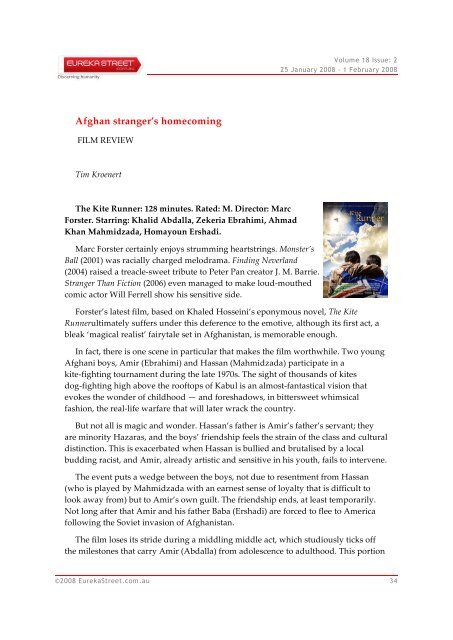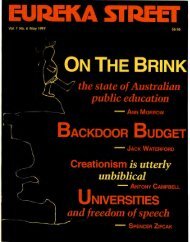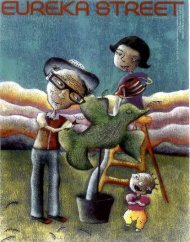25 January 2008 - 1 February 2008 Volume: 18 Issue: 2 Cricket ...
25 January 2008 - 1 February 2008 Volume: 18 Issue: 2 Cricket ...
25 January 2008 - 1 February 2008 Volume: 18 Issue: 2 Cricket ...
You also want an ePaper? Increase the reach of your titles
YUMPU automatically turns print PDFs into web optimized ePapers that Google loves.
Afghan stranger’s homecoming<br />
FILM REVIEW<br />
Tim Kroenert<br />
The Kite Runner: 128 minutes. Rated: M. Director: Marc<br />
Forster. Starring: Khalid Abdalla, Zekeria Ebrahimi, Ahmad<br />
Khan Mahmidzada, Homayoun Ershadi.<br />
Marc Forster certainly enjoys strumming heartstrings. Monster’s<br />
Ball (2001) was racially charged melodrama. Finding Neverland<br />
(2004) raised a treacle-sweet tribute to Peter Pan creator J. M. Barrie.<br />
Stranger Than Fiction (2006) even managed to make loud-mouthed<br />
comic actor Will Ferrell show his sensitive side.<br />
<strong>Volume</strong> <strong>18</strong> <strong>Issue</strong>: 2<br />
<strong>25</strong> <strong>January</strong> <strong>2008</strong> - 1 <strong>February</strong> <strong>2008</strong><br />
Forster’s latest film, based on Khaled Hosseini’s eponymous novel, The Kite<br />
Runnerultimately suffers under this deference to the emotive, although its first act, a<br />
bleak ‘magical realist’ fairytale set in Afghanistan, is memorable enough.<br />
In fact, there is one scene in particular that makes the film worthwhile. Two young<br />
Afghani boys, Amir (Ebrahimi) and Hassan (Mahmidzada) participate in a<br />
kite-fighting tournament during the late 1970s. The sight of thousands of kites<br />
dog-fighting high above the rooftops of Kabul is an almost-fantastical vision that<br />
evokes the wonder of childhood — and foreshadows, in bittersweet whimsical<br />
fashion, the real-life warfare that will later wrack the country.<br />
But not all is magic and wonder. Hassan’s father is Amir’s father’s servant; they<br />
are minority Hazaras, and the boys’ friendship feels the strain of the class and cultural<br />
distinction. This is exacerbated when Hassan is bullied and brutalised by a local<br />
budding racist, and Amir, already artistic and sensitive in his youth, fails to intervene.<br />
The event puts a wedge between the boys, not due to resentment from Hassan<br />
(who is played by Mahmidzada with an earnest sense of loyalty that is difficult to<br />
look away from) but to Amir’s own guilt. The friendship ends, at least temporarily.<br />
Not long after that Amir and his father Baba (Ershadi) are forced to flee to America<br />
following the Soviet invasion of Afghanistan.<br />
The film loses its stride during a middling middle act, which studiously ticks off<br />
the milestones that carry Amir (Abdalla) from adolescence to adulthood. This portion<br />
©<strong>2008</strong> EurekaStreet.com.au 34

















